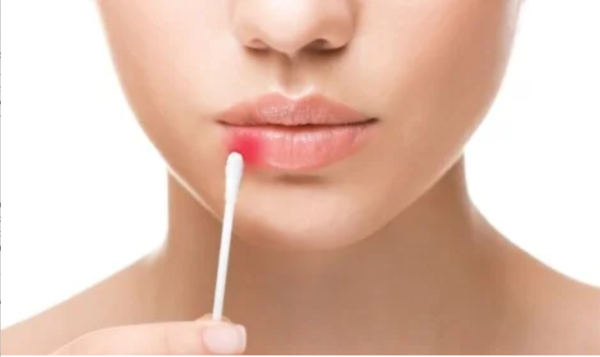Cold Sores and Stress


Written and verified by the psychologist Valeria Sabater
Most of us have experienced it at some point. When you go through a time of excessive pressure, worry, or anxiety, you may notice a terribly painful cold sore on your lip. Herpes labialis, commonly known as cold sores, are a common condition triggered by stress. But most importantly, they prove that our emotions can alter our physical health and organic balance.
The most common type of cold sore is herpes simplex (HSV-1), a viral infection that, once it appears, always remains latent. It’s enough to have a little fever or to go through a few days of or stress for those small but annoying cold sores to appear. However, there are also other types of herpes that can come alongside stress, anxiety, or depression.
There’s research on the impact that herpes zoster (blistering, painful skin rash similar to chickenpox) or genital herpes can have on people with a mood disorder. All of these connections make it essential to delve much deeper into the relationship between the immune system and emotional disorders.

Stress and herpes: symptoms, causes, and treatment
Herpes viruses are more complex than we might think. They have the peculiarity of hiding their genome, so it’s common for them to remain dormant for life. That’s why they usually appear when you least expect it. For example, during a cold, during PMS, when you sunbathe a lot, or in periods of stress and anxiety.
Studies such as those conducted at the University of Helsinki, for example, indicate that this could be dangerous in some cases. There are various types of herpes and some are oncogenic – they can give us cancer. Herpes simplex type 2, which manifests itself in the genital area, can sometimes lead to cancer of the uterus. Thus, the fact that emotional disorders impact the reappearance of these types of latent virus is a risk that you must understand and consider.
Let’s delve a little deeper into these correlated factors.
Herpes simplex (HS1) and stress – why do cold sores appear?
Herpes simplex (HS1) is a mild disease and rarely brings more serious complications. It usually appears when you have a temperature, and its signs are those typical cold sores or blisters around the mouth or nose. Studies such as those conducted at Ohio State University show that occasional but intense stress can affect immunity.
Among all the physical symptoms you may experience (muscle pain, headaches, digestive disorders, etc.), the appearance of herpes simplex is quite common.
Herpes zoster and mood disorders
You know that herpes and stress are related. However, there’s another important fact to keep in mind. The type of stress you undergo may lead to the appearance of different forms of herpes. For example, experts point out that chronic stress, stress you’ve been carrying for months or years, can be a determining factor in the appearance of herpes zoster.
In 2018, the American Journal of Epidemiology published an interesting study on this subject. After conducting research on the British and Danish population, the following was discovered:
- Emotional disorders are associated with an increased risk of suffering from herpes zoster.
- Herpes zoster is an infection generated by the reactivation of the varicella-zoster virus. Its most visible sign is a skin rash on the face, chest, or back. Thus, in addition to the classic blisters, neuropathic pain also appears due to inflammation of the nerves in the affected areas.
- This type of herpes reoccurs only when you’ve been suffering from a mood disorder for weeks or months, whether it be stress or depression.
- It’s also common for it to appear among people over 50 years of age.

Cold sores: herpes simplex 2 and stress
Herpes simplex 2 (HS2) appears in the genital area and its visible signs are lesions on the skin and the internal mucous membranes. In these cases, recurrent stress also increases the likelihood of this viral condition reappearing. It’s true that this sexually transmitted disease can appear and disappear in different outbreaks, but it’s often triggered by mood.
Thus, as we pointed out at the beginning, genital herpes has one major risk – it increases the probability of suffering from cervical cancer. Therefore, it’s crucial that, if you suffer from it, you have regular check-ups and follow the treatments with antiviral drugs prescribed by specialists.
Herpes caused by stress: how to treat it?
The treatment of herpes due to stress always involves understanding one crucial aspect. To date, we still don’t fully understand the mechanism by which these types of viruses work. However, their main characteristic is that they often remain dormant and appear unexpectedly.
Making them disappear is almost impossible and, thus, you might end up getting used to them popping up when you’re sick, when your defenses are low, or when you have an emotional disorder. That’s why the most important thing you need to do is take care of your physical and emotional health.
Good nutrition, protection against sexually transmitted diseases, and regular check-ups with your healthcare provider are the best options. However, having some basic strategies to deal with daily stress is also essential. Here’s some simple advice.
- You must practice “good mental hygiene”. In other words, watch what you think and say to yourself. Negative inner dialogue and irrational thoughts are two of your greatest enemies.
- You must learn to solve problems before they pile up. Facing daily challenges with calm, security, resolve, and originality can help you.
- Relaxation, meditation, and breathing techniques are very healthy everyday habits.
- Having someone to talk to, enjoying moments of leisure, and having time for yourself is essential to achieve a sense of well-being.
In short, you may have gotten used to getting cold sores on your lip after an exam, an interview, or a fight with your partner. However, you must remember one thing. Behind these manifestations, there are usually a series of emotions that you must attend to. This is key.
All cited sources were thoroughly reviewed by our team to ensure their quality, reliability, currency, and validity. The bibliography of this article was considered reliable and of academic or scientific accuracy.
- Giuseppe Balistreri, Johanna Viiliäinen, Mikko Turunen, Raquel Diaz, Lauri Lyly, Pirita Pekkonen, Juha Rantala, Krista Ojala, Grzegorz Sarek, Mari Teesalu, Oxana Denisova, Karita Peltonen, Ilkka Julkunen, Markku Varjosalo, Denis Kainov, Olli Kallioniemi, Marikki Laiho, Jussi Taipale, Sampsa Hautaniemi, Päivi M. Ojala. Oncogenic Herpesvirus Utilizes Stress-Induced Cell Cycle Checkpoints for Efficient Lytic Replication. PLOS Pathogens, 2016; 12 (2): e1005424 DOI: 10.1371/journal.ppat.1005424
- Padgett, D. A., Sheridan, J. F., Dorne, J., Berntson, G. G., Candelora, J., & Glaser, R. (1998). Social stress and the reactivation of latent herpes simplex virus type 1. Proceedings of the National Academy of Sciences of the United States of America, 95(12), 7231–7235. https://doi.org/10.1073/pnas.95.12.7231
- Prehananto, H., & Harijanti, K. (2016). Management of herpes labialis triggered by emotional stress. Dental Journal (Majalah Kedokteran Gigi), 49(4), 229. https://doi.org/10.20473/j.djmkg.v49.i4.p229-233
- Hsu, P.-C. (2014). Prenatal stress, depression, and herpes viral titers. Dissertation Abstracts International: Section B: The Sciences and Engineering, 75(3-B(E)),
This text is provided for informational purposes only and does not replace consultation with a professional. If in doubt, consult your specialist.








